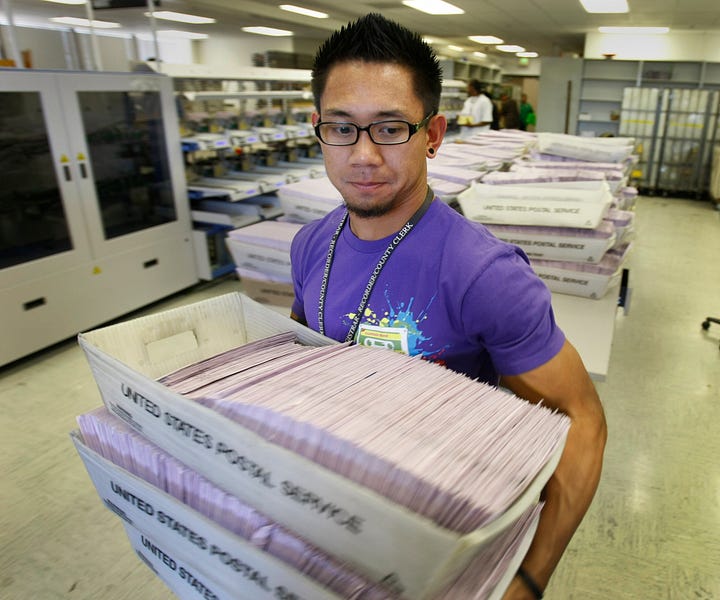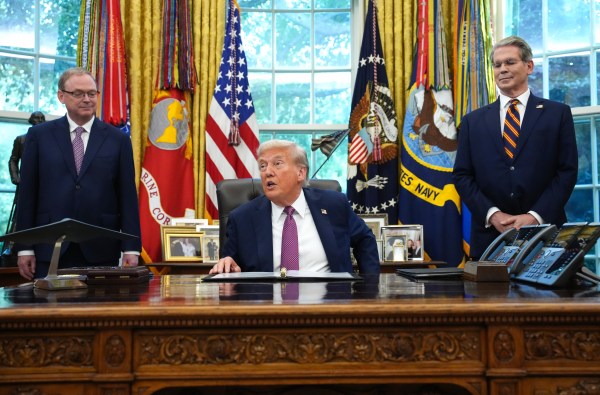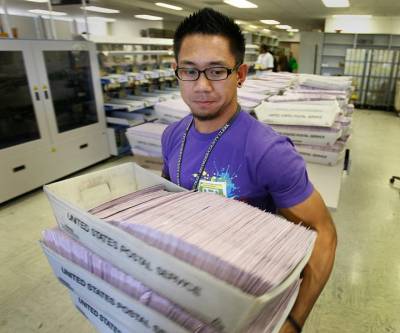On Monday, Nevada passed a bill that will send official ballots to all registered voters in the state before the presidential election this November. This marks the eighth state—in addition to D.C.—to adopt universal, unsolicited mail-in voting for the election over pandemic concerns. President Trump immediately threatened to sue Nevada—a key battleground state—in response to the order. But Nevada’s universal vote-by-mail law is just the tip of the proverbial iceberg. From California to New York, the Republican National Committee has been suing states for months now and even recently doubled its funding efforts to bolster new litigation efforts across the country.
After passing in Nevada’s Democratic-controlled state legislature, the bill was signed into law Monday afternoon by Democratic Gov. Steve Sisolak. “Today, I signed AB 4, which ensures protections for Nevadans to vote safely at the November election during the pandemic,” Sisolak tweeted Monday. “During this global pandemic, I made a commitment that we’d do all we can to allow Nevadans to safely cast a ballot in the upcoming November election.”
Given his penchant for criticizing mail-in voting in recent months—and his recent suggestion that we should consider delaying the election over universal mail-in voting concerns—it came as no surprise that Trump immediately criticized the move.
This isn’t an empty threat: The GOP is currently litigating in 19 states over election laws that institute universal mail-in voting, no-excuse absentee ballots, and/or other election laws that Republicans believe jeopardize the integrity of our democratic system. The Republican National Committee recently doubled its legal budget to $20 million—after an initial commitment of $10 million in February—to challenge statewide election laws.
After Congress raised the federal contribution limits in 2014, six-figure donations can “waterfall,” meaning that a single donation can be used to fill individual contribution buckets—operating funds, nominating convention, etc—one at a time until a donor reaches the combined maximum. The legal fund is the last bucket: This is standard and applies to the Democratic National Committee as well. “There’s more than enough money out there on both sides of the aisle,” said David Warrington, president of the Republican National Lawyers Association, in an interview with The Dispatch.
But the GOP fears that even its $20 million legal security blanket won’t be enough to stave off what Republicans claim to be bad faith attempts by Democrats to push laws that skew elections in their favor. “Democrats changed the rules of the game at the last minute to try and rig this election,” RNC Chairman Ronna McDaniel alleged in a press release on Wednesday.
Nevada’s new law means that before the election, the state will mail ballots to every voter on its voting rolls, including in those ballots prepaid postage for their return. “The reason that that is problematic is voter rolls are notoriously not accurate,” Warrington told The Dispatch. “The error rate on voter rolls can swing pretty dramatically depending on where you are, because you have people who die, you have people that move, you have people that change addresses, leave the state,” he said. “There are various other reasons why somebody whose name may be on the voter roll today may not actually be an eligible voter to vote in that state.”
Nevada Republicans are up arms about the bill. “When you have a leadership that decides to change the election laws less than 100 days out from the election, obviously there's an agenda put on the plate,” said Nevada GOP Chairman Michael McDonald in an interview with The Dispatch. “They had a 100-page bill that was drafted up, and clearly was drafted up by some D.C. lawyer, this is nothing that came out of Nevada. It was a back room, smoke-filled, however you want to put it, dirty bill that was dropped.”
“Many of our elected officials had less than an hour to review it before they’re supposed to be voting on it,” he said. “They’re using the COVID-19 crisis as the shield, but clearly you can stand in line to go to Costco, Sam’s Club, you go out in the public, our casinos are open here but yet you can't can’t stand in line to cast your ballot.”
Mail-in voting might be a hot topic leading up to November’s election, but by no means is it a new phenomenon. In 2016, nearly 25 percent of all voters cast their ballots absentee. Historically speaking, universal mail-in voting has proved to be extremely effective in the five states that have conducted their elections by mail for several years now. In these states—Colorado, Utah, Washington, Hawaii, and Oregon—instances of fraud have remained remarkably low.
“Oregon, which began voting by mail 20 years ago, has had 12 proven cases of fraud out of 100 million ballots,” explained Rachel Kleinfeld, a senior fellow in the Democracy, Conflict, and Governance program at the Carnegie Endowment, in The Dispatch. “The Heritage Foundation has been collecting cases of fraud and has found less than 1,100 over the last 20 years—but that’s out of about 250 million mail-in votes over that time period.” Instead of notarizing each and every mail-in ballot, states use bar codes and signature matching technology that have proven to be effective in curbing election fraud. In the rare event that these technologies are circumvented, fraudsters are met with hefty fines—up to $25,000—and even prison time.
Republicans maintain that the problem isn’t with mail-in voting per se, but universal mail-in voting with no safeguards. “There is a clear difference between what Democrats are pushing this cycle and a typical absentee ballot request process,” RNC National Press Secretary Mandi Merritt told The Dispatch. “Democrats are determined to remove every safeguard on absentee ballots that ensure the integrity of the process, and turn our election into an out-of-control all-mail based election.”
While those states make a strong case that voting by mail can work well and be fraud-free, it’s also true that we are living in an unprecedented time and there are bound to be problems with states having to accommodate unusually high numbers of mailed ballots with no existing framework for doing so.
“Absentee ballots are subject to fraud—but it is actually lowest in states prepared with the technology for widespread vote by mail,” Kleinfeld explains. “It is in states where absentee ballots are rare and anomalous to the mass voting system where most fraud has taken place.” Democrats’ push for universal mail-in voting in all 50 states must wrestle with this reality.
“Democrats often hold up the five all-vote-by-mail states to advance their argument here, but it’s important to remember that none of them send ballots to inactive voters,” an RNC spokesperson told The Dispatch. “Washington, for example, requires voters to provide some identifying information in the return envelope—another safeguard that Democrats are suing to eliminate.”
The GOP argues that states won’t be able to simply flip a switch from normal numbers of absentee voters to 100 percent mail-in voting. “States simply do not have the procedures in place to move to predominantly vote-by-mail elections or oversee the secure mass mailing of ballots to all registered voters by November,” Merritt told The Dispatch. “The chaos caused by an attempt to forcibly implement these policies will disenfranchise voters and destroy public confidence in the integrity of our elections.”
As Sarah Isgur emphasized in her Monday newsletter this week, The Sweep, New York’s June 23 primary election is a prime example of the kind of electoral disaster that can occur when states are unprepared for such a drastic shift to mail-in voting:
Several of the races have yet to be called because of the enormous delay in counting tens of thousands of absentee ballots. By way of comparison, in 2016, 23,000 absentee ballots were returned and validated in New York. This year, there were more than 400,000 absentee ballots returned...Of those ballots that made it back to their voting precinct, “tens of thousands of mail-in ballots were invalidated for technicalities like a missing signature or a missing postmark on the envelope.” And that’s not even counting the people who requested an absentee ballot that never arrived or arrived after the election.
For all the work that the GOP has done to oppose mail-in voting, why did President Trump announce this week that it was fine to vote by mail in Florida? Many Americans are puzzled by his comments. The state presents an interesting dilemma for the president, given the huge number of Trump-supporting elderly Floridians—many of whom will vote absentee over coronavirus concerns—that he knows he can’t afford to lose. “In the case of Florida they’ve done a great job, they’ve had tremendous success with it, but they’ve been doing this over many years and they’ve made it really terrific,” Trump said at a Tuesday evening press briefing. “So for Florida, you can mail in your ballot, you don’t have to go.”
Republican strategists cite Florida’s record of evading election fraud as a reason to have faith in its electoral integrity. “I think the difference with Florida is that Florida has a number of safeguards to make sure that the person voting the ballot is actually the person who’s entitled and eligible to vote that ballot,” Warrington said.
Some Republican lawmakers stand by the integrity of statewide mail-in voting procedures. On Saturday, Sen. Marco Rubio said he is “not concerned” about mail-in voting in his state.
“Mail-in voting has been used in a lot of places for a long time,” Senate Majority Whip John Thune said. “And honestly, we got a lot of folks, as you know, who are investing heavily to try to win that war. It’s always a war too for mail-in ballots. Both sides compete and it’s always an area where I think our side—at least in my experience—has done pretty well.”
Given the unprecedented public health challenge that the coronavirus presents to the upcoming presidential election, it is of paramount importance that states are able to provide safe alternatives to in-person voting, especially for elderly and at-risk populations. But for the states that are calling for universal vote-by-mail for the first time this year, they’d better be ready for a tidal wave of invalidated ballots (over improper postmarking, missing signatures and the like) and overwhelmed ballot centers. Not to mention the near inevitability of delayed election results nationwide.
Photograph by Allen J. Schaben/Los Angeles Times/Getty Images.







Please note that we at The Dispatch hold ourselves, our work, and our commenters to a higher standard than other places on the internet. We welcome comments that foster genuine debate or discussion—including comments critical of us or our work—but responses that include ad hominem attacks on fellow Dispatch members or are intended to stoke fear and anger may be moderated.
With your membership, you only have the ability to comment on The Morning Dispatch articles. Consider upgrading to join the conversation everywhere.